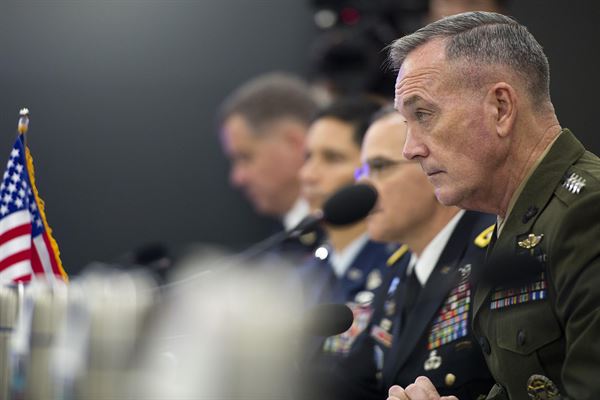
WASHINGTON: The chairman of the Joint Chiefs of Staff, top military advisor to the president, today proposed creation of a staff to help the Defense Secretary better plan and execute America’s war plans that involve huge swaths of the globe and outer space.
“This is not the Chairman of the Joint Chiefs saying, ‘I need a general staff and I need more authority.’ That’s not actually what this is about,” Gen. Joseph Dunford said at a conference organized by the Center for New American Security and our colleagues at DefenseOne. Dunford, who knows the operational side better than the great majority of his multi-starred colleagues because most of this career has been spent in command positions, said this staff would have “the perspective of all the combatant commanders.” It would be charged with providing the Defense Secretary “with a common operational picture that can actually frame decisions for the SecDef that do involve multiple regions simultaneously and do it in a timely manner.”
Why is this needed, you may wonder. Well, Dunford put the case bluntly: “As you know, that’s not currently what the Joint Staff is designed to do.” And he’s absolutely right.
Why doesn’t America have something similar to a general staff? As with so many issues that still affect the American military, it goes back to World War I. Fear of a general staff — borne of the early drubbing allies received at the hands of Germany’s fabulously effective but politicized General Staff — entered both the popular and military consciousness, especially after World War II. The argument went that the General Staff gradually supplanted many of the institutions that ran the German state. When the Nazis took power, that meant that Hitler had at his command an incredibly powerful and effective military tool that helped him take control of the state and helped lead to world war. To this day, discussing the idea of a permanent staff to plan campaigns and to help execute war plans elicits at least raised eyebrows from many American military experts.
Dunford is raising the issue because, as Breaking D readers knew first, Sen. John McCain, chairman of the Senate Armed Services Committee, has launched a series of hearings designed to consider the need for reform to the existing military authorities embodied in what is popularly known as Goldwater-Nichols, a mass of law the redrew the lines of US military command authority and created the Joint Staff in its current form. But the Joint Staff, because of that concern about building a “General Staff,” has little to do with fighting a war. That is done by the regional combatant commanders, the chairman and the defense secretary.
Dunford said the current structure could handle transnational threats spread across the globe, but he clearly thinks it wouldn’t do it as well or as quickly or efficiently as the new staff he’s proposing. One of the things that will be very interesting to watch will be how these staff are selected (will they be the best of the best) and will Dunford propose that they receive special training. Also, will those staff members remain in their positions for longer than usual or will they be subject to the usual too-short service rotation schedule of 18 to 24 months?